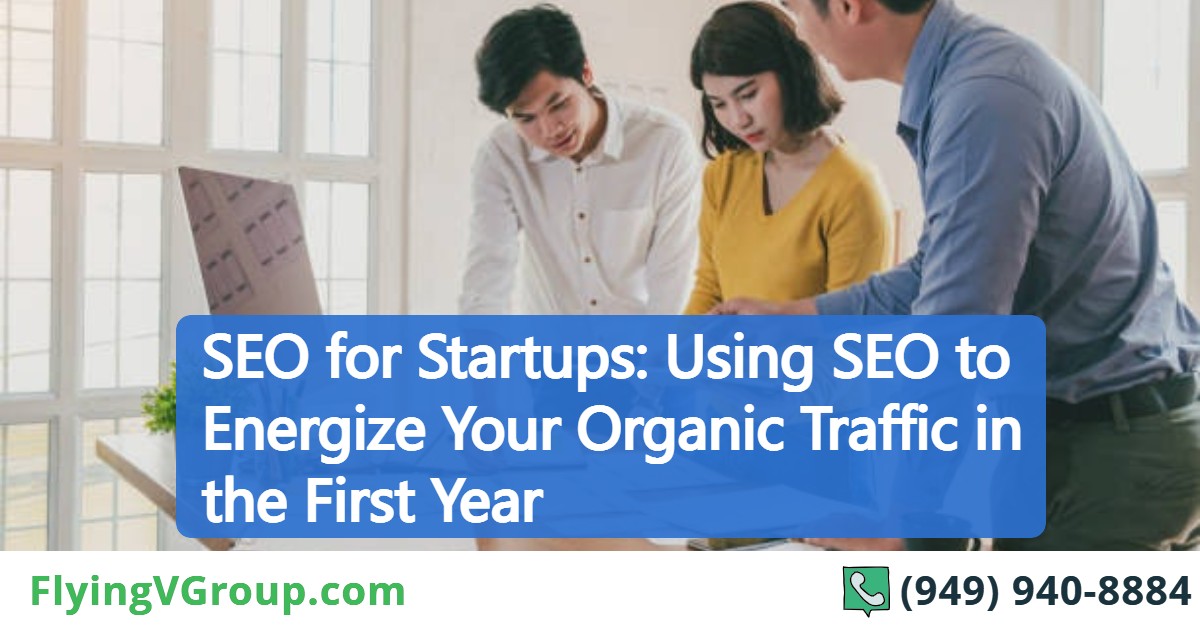Getting a startup off the ground in the first year is a challenge. Brand awareness, website traffic, and sales don’t happen overnight, especially if your startup is lost in a sea of competitors.
Startups need solid marketing strategies to establish themselves in competitive markets and get their name out in the world in the first year. Without effective marketing tactics, the startup may not get the traffic to last into the second year.
In addition, startups are often dealing with virtually nonexistent budgets and a small marketing team (if they have one at all). Most of the capital is devoted to brand strategy and product development, instead of marketing.
Search engine optimization (SEO) is just the solution. It costs nearly nothing and can significantly boost your search engine ranking to drive traffic to your website, and all it takes is some effort.
The key is to get your website or content on the first page of the search engine results, however. When most people conduct a search, they’re clicking on the first few results on the first page. If you appear low on the first page, or worse, on the next few pages, you may not be found.
Getting your website and content on the first page is crucial for generating organic traffic, and the best way to accomplish that is with an SEO strategy designed for startups in the first year.
Why SEO Matters
SEO is a valuable marketing strategy that optimizes search engine rankings to drive more organic traffic to the website or pages. Unlike paid ads, which give you traffic in return for money, SEO is totally free. Searchers simply come across your content and click on it, directing them to your website.
If you can deliver valuable and timely content that answers searchers’ questions, you can gain a higher ranking and more brand authority. Your content should be suited to your audiences, such as podcasts, webinars, blog posts, web pages, articles, and videos.
For example, if you were a parent of a teen driver preparing for a permit or driving test, you may search for learning resources for student drivers. When you see the first few results on the search engine results page and click on them, you may find information that’s helpful to you. This may lead you to look for more information on the same site, showing the search engine that the results were relevant to your search.
How SEO Helps First-Year Startups
Startups are pulled in a million directions, from product development to building a brand to managing day-to-day operations. Most startups simply don’t have the capital to throw a lot of marketing spend at paid advertising or targeted brand awareness strategies.
SEO is an organic way to boost traffic and brand awareness, giving startups incredible ROI and numerous other benefits.
Inexpensive Traffic
As mentioned, SEO is practically free in that it only takes time and effort. If you hire content creators, it can be more expensive, but still not as much as paid advertising. And for that effort and marketing spend, you can generate excellent returns in organic traffic.
Brand Awareness
Startups are often up against a lot of competition from enterprise brands. SEO helps you stand out against the competition if you provide better and more relevant content. As searchers find your content, they learn more about your brand and your products or services. Over time, they can become paying customers and may recommend your brand to others.
Brand Authority
Brand authority is the credibility, trust, and expertise your brand has in the public eye. You can gain brand authority through providing positive customer experience and positioning yourself as an industry authority through valuable content.
Develop Your First-Year SEO Strategy
No SEO strategy is one-size-fits-all – it will be tailored to your brand and industry. But here are the key steps to developing your own SEO strategy.
Define Your Audience
Traffic for the sake of it won’t do much for your business. It needs to be highly targeted to your customers, the customers who are likely to make a purchase. For example, if you offer teen driver resources and you’re getting traffic from single city residents with no kids and no vehicle, that’s not doing much for your brand.
Your traffic needs to come from the people who are looking for what you have to offer and likely to make a purchase at some point. You may not get a purchase right away, but you want traffic from people who are actively seeking to solve a problem or currently considering solutions to their problem.
You may also need to segment your audience. Back to the example of teen driver resources, that may have two audiences: the teen drivers or parents of teen drivers, both of whom are likely to be searching for educational resources.
They’re coming at that from different angles, however, and should be segmented. For example, the teen may consume teen driver content on social media, while the parent may be more likely to look for resources with a general search on Google.
Consider questions like:
- What are my customers’ pain points?
- What problem does my product or service solve?
- What are my customers’ demographics (age, job, location, income, etc.)?
- How do my customers spend time online?
- How do my customers consume content?
- How can I deliver value to them?
The more you can drill down and understand your audience, the better you can serve their needs through content.
Be Consistent
Startups tend to be chaotic with everyone pulled in different directions. Adding SEO strategy and content to the mix can feel like too much, but it needs to be a priority.
One of the easiest ways to do this is with a schedule. Decide on the number of times you can post content and stick to it. If possible, plan your content schedule months in advance, so you’re never scrambling to share something and sacrificing quality. This also gives you some freedom to address topical subjects, such as news stories or fast trends.
Use Keyword Research
Keyword research is used to guide your content. You can research the keywords your audience is likely to use and base your content around them. Don’t just go for the highest-volume keywords, either. Choose low-hanging keywords that have high search engine rankings and lower competition, which can get your content ranked higher at the start.
Consider longtail keywords as well. Often written as phrases, such as questions, these keywords establish search intent and give you valuable insights into your audience.
Establish Yourself as an Authority
Setting your brand apart is always a challenge, but it’s necessary to stand out in your first year. You need to build your brand from the ground up and position it as a source of information and value for customers, which can drive more and more traffic to your website and content.
This also has benefits for SEO. The search engine will see you as a brand authority, too, and will recognize your content as targeted and relevant. Always work on the topics you know well and target them to what your audience needs.
Build Backlinks
Building backlinks, also known as linkbuilding, is one of the most challenging aspects of SEO. Backlinks are links from credible websites that direct the audience to your website or content. You get organic traffic when readers of the external site follow the links to your content.
Backlinks have a ton of value for SEO, especially with domain authority. As authoritative websites link to you, they pass some of their authority to you, and search engines give you a higher ranking.
This can’t happen overnight – it takes patience and effort. It’s best to start as early as possible to build a robust backlinking strategy.
Fix Technical SEO
Technical SEO affects how search engines index your website and its content. When a search engine crawler checks out your website, it’s interpreting the structure and prioritizing the content to decide where it should rank.
You can improve technical SEO by:
- Fixing any site performance issues, such as slow load times or broken links
- Optimizing content for mobile devices to ensure that the page is still functional when it switches from desktop to mobile
- Using a schema markup to help search engines index the site
Technical SEO takes some technical know-how, so consider outsourcing to a technical professional to optimize the website.
Be Patient
SEO boasts incredible ROI, but it’s not a quick fix. You can’t throw money at it or take shortcuts to get better traffic or rankings. Even if you opted for paid posts, you may end up blowing a lot of your budget for traffic that won’t translate to sales in the future.
Be patient with your SEO strategy and focus on developing solid, repeatable efforts. As you create more content and build your links, you’ll get more and more traffic, better rankings, and better brand authority over time.
Energize Your SEO
Startups have to hit the ground running in the first year to make it. SEO is a highly effective and beneficial marketing strategy that gains organic traffic, brand authority, and loyal brand advocates, all without spending a lot of your marketing budget.
Author Bio
Tim Waldenback is the co-founder of Zutobi, a gamified e-learning platform focused on online drivers education to help teens get their license. Tim founded Zutobi to make world-class driver’s education fun, affordable, and easily accessible for all.
SHARE THIS POST
Thank you so much for reading SEO for Startups: Using SEO to Energize Your Organic Traffic in the First Year . We really appreciate it! If you have any questions about our article, or can suggest any other topics you think we should explore, feel free to let us know.
Be sure to sign-up for our newsletter to receive monthly emails on all of the latest trends and happenings in the digital marketing space. You will also receive our FREE E-Book with the Amazing Marketing Tools for Powerful Business Growth. Sign-up below!
Also, if you received some value out of this article, please share with your friends or colleagues, or leave a comment/question below. We really appreciate you reading our blog and every share/comment means the world to us and allows us to continue producing valuable tools to help you grow your business!a






0 Comments